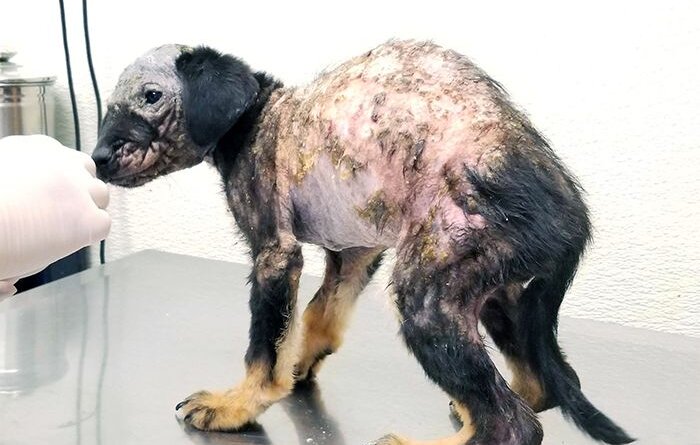Are There Home Remedies for Mange?
Mites cause two types of mange, Demodectic and Sarcoptic, which is also known as scabies. Both cause itching, hair loss, pain, secondary infections, and relentless scratching, biting, and licking. There are no effective home treatments for mange, so prompt veterinary care is essential.
Demodectic mange is spread by Demodex mites, which are present on dogs in low numbers as part of their normal fauna. Demodectic mange is not contagious between dogs, and in dogs with healthy immune systems, the mites don’t create problems. In vulnerable dogs, it spreads across the body, lasts for more than one or two months, and may involve all four feet. Hair loss, yellow debris matted around the base of hairs, red bumps, and variable itching are the main symptoms. Hypothyroidism, Cushing’s disease, and other autoimmune disorders can trigger outbreaks.
Canine scabies (sarcoptic mange) is less common, affecting up to 4% of dogs, but is more serious. Mites burrow into the dog’s skin, usually where there is little hair, such as near the ear flaps, elbows, hocks, and belly, and the results are extremely painful. Non-stop scratching leads to lesions, crusting, and hair loss. Sarcoptic mange is highly infectious from one dog to another.
How is mange treated?
Traditional home remedies such as the topical use of motor oil, lemon juice, yogurt, or aloe vera are not recommended, as they are all ineffective and often harmful to the patient. Repeated lime-sulfur shampoos or dips and the antiparasitic medication ivermectin were the main treatments for both types of mange until recently, when isoxazoline drugs (such as NexGard and Bravecto) replaced them. Originally developed to control fleas and ticks, isoxazolines are highly effective at treating mite infestations, but can cause adverse neurological side effects in some dogs, requiring a thorough medical exam before prescribing.
Mange requires prompt and appropriate treatment with prescription medications that will kill the mites that cause it. Additional supportive care in the form of antibiotics to treat infection caused by scratching or chewing, and medicated baths may be needed as well.




